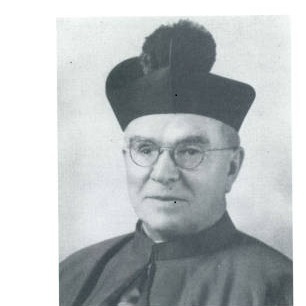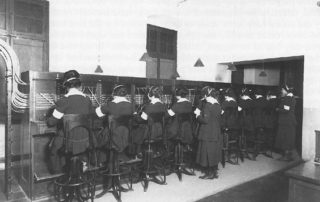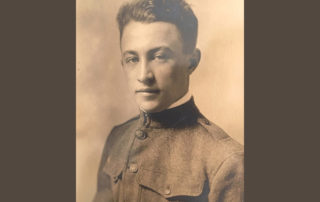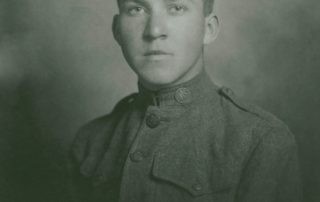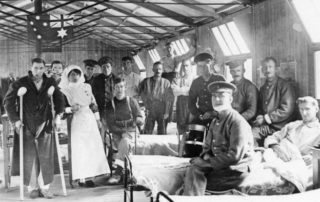Not everyone who went to war was a soldier or nurse. Chaplin Walter Beaudette (1884-1962) was a Roman Catholic chaplain with the American Expeditionary Force (A.E.F.) in France from 1917-1919. He was one of 1,300 American clergyman who accompanied the A.E.F. to France, and his letters paint a vivid picture of wartime life. Born near Chippewa Falls, Beaudette attended Sacred Heart College in Prairie du Chien and the Grand Seminary in Montreal, Canada. In 1908, he was ordained a Catholic priest for the Diocese of Superior and served in parishes in Bruce (Rusk County), Rice Lake, and Rhinelander, before enlisting in the United States Army.
In these letters, he writes to his friend, Rhinelander attorney Al O’Melia.
Find more about Beaudette in the Wisconsin Magazine of History.
November 26, 1917 Dear Al.— Have moved up to the trenches since I last wrote. The roar of artillery was incessant lately. At night our 12 inch Howitzers shake our huts and make sleep difficult. One cannot expect comforts so near the line and we don’t have them. We are with the British troops and we are railroaders. Today the weather was fine and planes were visible continuously. We are provided with two sets of gas masks, one for “smoke-shells” which is slipped on in 6 seconds, one for “stink-clouds,” which requires a little more time for adjustment. One must carry his “gas-faces” with him always, even at work. A fellow with his mask on appears as formidable as a Ku-Klux Klansman. We have enough food & fuel and good at that. We are short of reading material and tobacco. We have shells, mountains of them big and small. I hold services on Sundays in a mess hall. The Protestants have services too. The Britisher is a good soldier, uses no cot to sleep on as we do. We use 5 blankets over here. When a damp Northerner blows we could stand tons of blankets. Tents are used much as shifting of quarters is frequent for certain reasons… More next time. Regards to all. Chaplain W. Beaudette
December 20, 1917 Dear Al,— I went up ahead of the heavy batteries recently to call at an artillery first aid hospital many feet underground. We had an ambulance train on which I generally ride. We were hardly at the station and I was following the stretcher-carriers to the hospital when an inferno of shells broke loose on the whole place. Was I scared? I was. We dug for the nearest dugout and waited for the storm to subside. Out we come when again a hell breaks loose, just high explosives, no shrapnel. Fragments fell a few feet away. Our shell struck about 100 feet away—so back in the dugout for ours. I remained imprisoned there a long time with my gasmask as gas shells always accompany other shells. Really I thought I would be killed. Anyhow the shelling ceased and we went about our business. Our ambulance trains usually go down after wounded when it is dark but it had been quiet here so we took a chance. I may not say what became of the train it may have been undamaged, and it may not. I received my battle tags recently, one remains around my neck, the other is detached and sent forward. The instructions to me were: “This tag we send forwards, the other tag you will be buried with.” Rather cheering isn’t it. Well I’ll bring both of them home if I can. What I said could happen anywhere along the line hence I feel certain the censor will not object to what I wrote. Regards. Chaplain W. A. Beaudette
